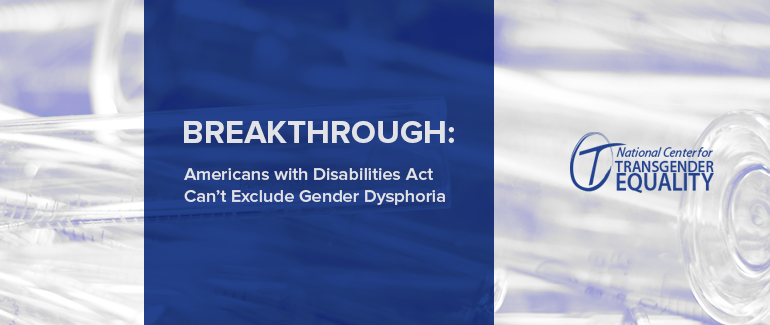Breakthrough: Americans with Disabilities Act Can’t Exclude Gender Dysphoria

Last Thursday, trans people had yet another important win in the courts. A court in Pennsylvania ruled that the Americans with Disabilities Act (ADA) can cover gender dysphoria, a condition that many trans people have. Courts have already said—repeatedly—that sex discrimination laws bar anti-trans discrimination, but this is the first time that a court said that transgender people are protected by the federal disability law too. This win means that many trans people have an additional legal option when they’re advocating for their rights—one that applies to employment, public accommodations, and government services.
This landmark case was brought by Kate Lynn Blatt, a transgender woman who, for months, faced constant harassment while working at Cabela’s Retail before they fired her. She sued under two federal laws: Title VII, which protects employees from sex discrimination, and the American with Disabilities Act, or ADA, which protects people with disabilities. Her case isn’t over yet, but yesterday’s win was a major step forwards for her and many trans people across the country.
While some trans people have successfully won cases using state disability laws, courts have generally said that the ADA, the federal disability law, bars people from suing over anti-trans discrimination. That’s because when Congress passed the ADA in 1990 it included an exclusion—based on myths that have long been debunked—saying that “transsexualism” and “gender identity disorders” don’t count as a disability. The National Center for Transgender Equality, together with GLAD and other advocacy organizations, filed a brief saying that, based on current medical science and the best reading of the law, that exclusion shouldn’t include gender dysphoria as we know it today—and indeed the exclusion might be unconstitutional—and under President Obama, the Department of Justice told the court they agree with us.
And now, the court reached that conclusion too. The judge said that the best way to interpretation of the ADA is that “transsexualism” just means being trans in and of itself, so simply being trans wouldn’t count as a disability under the ADA. But, the court said, the exclusion doesn’t apply to gender dysphoria, a medical condition that some trans people have. Gender dysphoria refers to “clinical significant distress” resulting from a difference between someone’s gender identity and sex assigned at birth. Not all trans people have gender dysphoria, but for those who do, that distress can have a major impact on their ability to work, participate in public life, and be healthy. And the court—in a position that’s in line with what medical experts have been saying for years—said that the ADA may protect the rights of trans people with gender dysphoria to live according to their gender identity.
Does this mean that being transgender is considered a disability? No. Gender dysphoria, a medical condition that some transgender people have, can sometimes be considered a disability that is protected under laws like the ADA. NCTE opposes discrimination and stigma against people living with disabilities, whether that includes gender dysphoria or other medical conditions that many transgender people live with.
So what does this mean for trans people? It means that some trans people have another tool in their legal arsenals to assert their rights, along with other federal nondiscrimination laws like Title VII and Affordable Care Act. And under the Americans with Disabilities Act, it might be possible for some trans people to get a wider range of protections than under sex discrimination laws. One reason for that is that the ADA covers some places—including public accommodations (like retail stores, hotels, and government offices) and government services—where federal sex discrimination laws may not apply or may not offer clear, strong protections. The ADA’s protection may also be stronger in some circumstances because it explicitly requires providing “reasonable accommodations” to people with disabilities. And, like Kate Lynn, many people can use both the ADA and sex discrimination laws to make sure they get treated fairly and respectfully.
If you have faced discrimination, we encourage you to contact an LGBT-friendly lawyer or one of the legal organizations listed on NCTE’s website.

